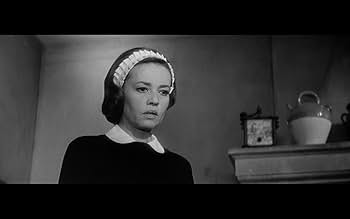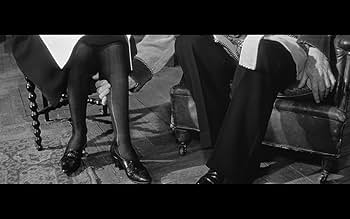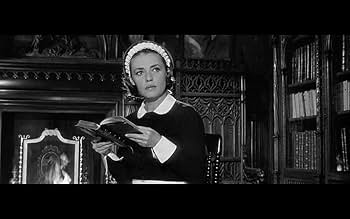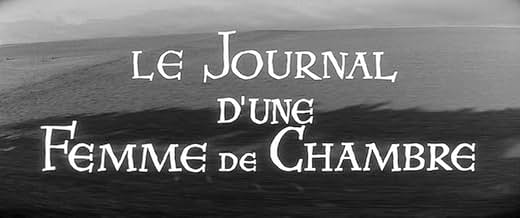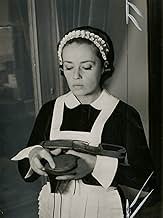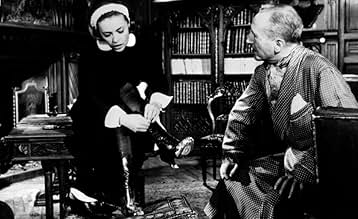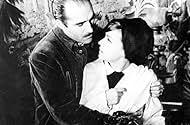VALUTAZIONE IMDb
7,4/10
10.157
LA TUA VALUTAZIONE
Una donna sofistica di Parigi entra in una casa rurale di classe media come cameriera e provoca un bel casino tra i vari perversi e violenti abitanti.Una donna sofistica di Parigi entra in una casa rurale di classe media come cameriera e provoca un bel casino tra i vari perversi e violenti abitanti.Una donna sofistica di Parigi entra in una casa rurale di classe media come cameriera e provoca un bel casino tra i vari perversi e violenti abitanti.
- Regia
- Sceneggiatura
- Star
- Premi
- 1 vittoria e 2 candidature totali
Recensioni in evidenza
In the 30's, the witty, literate and quite sophisticated chambermaid Céléstine (Jeanne Moreau) comes from Paris to work for the dysfunctional Monteil family in the country, more specifically for the fetishist on shoes and maniac for cleaning Monsieur Rabour (Jean Ozenne). His daughter and mistress of the house Madame Monteil (Françoise Lugagne) is a frigid and arrogant woman, and her husband, Monsieur Monteil (Michel Piccoli), is a hunter and also a wolf with their maids. Their fascist and rude worker Joseph (Georges Géret) feels a sexual attraction for Céléstine, but she repels him. Their neighbor, Captain Mauger (Daniel Ivernel), has a problem with the Monteils and dumps his garbage in their yard, but Céléstine talks to him and is motive of gossips. When Monsieur Rabour unexpectedly dies, Céléstine quits her job but while in the train station, she finds that the girl Claire was found raped and murdered by the police. Céléstine returns to her job convinced that Joseph killed the little girl and trying to find evidences against him.
"Le Journal d'une Femme de Chambre" is a delightful movie of undefined genre drama, black comedy, adventure? where Luis Buñuel again exposes fight of classes, hypocrisy of both the bourgeois and the working class, a historical moment in France with the fascism growing, the ridiculous role of the clerical and an unsolved murder case. The story is centered in Céléstine, but the motives why a woman with her profile accepts a job in a rural area is never clear. The identity of the rapist and killer of Claire is also not disclosed, there is only a strong insinuation that Joseph killed the girl. The story is very ironic, like for example when Monsieur Monteil is informed that Céléstine and Joseph will marry and requires the sexual favors from Marianne; or the weird fetishism of Monsieur Rabour; or the priest asking for a new roof for the church to Madame Monteil; or the conclusion with Captain Mauger changing his will and serving the mistress and smart Céléstine on their bed. My vote is seven.
Title (Brazil): "O Diário de uma Camareira" ("The Diary of a Chambermaid")
"Le Journal d'une Femme de Chambre" is a delightful movie of undefined genre drama, black comedy, adventure? where Luis Buñuel again exposes fight of classes, hypocrisy of both the bourgeois and the working class, a historical moment in France with the fascism growing, the ridiculous role of the clerical and an unsolved murder case. The story is centered in Céléstine, but the motives why a woman with her profile accepts a job in a rural area is never clear. The identity of the rapist and killer of Claire is also not disclosed, there is only a strong insinuation that Joseph killed the girl. The story is very ironic, like for example when Monsieur Monteil is informed that Céléstine and Joseph will marry and requires the sexual favors from Marianne; or the weird fetishism of Monsieur Rabour; or the priest asking for a new roof for the church to Madame Monteil; or the conclusion with Captain Mauger changing his will and serving the mistress and smart Céléstine on their bed. My vote is seven.
Title (Brazil): "O Diário de uma Camareira" ("The Diary of a Chambermaid")
The best thing about Bunuel is his ruthless lucidity, and it's thoroughly on display here. All his films start from the conviction that no one is to be pitied - or even if they are, Bunuel, like life, will not oblige, and neither the audience nor the person concerned should expect it of them. Which is not to say that all abuses are right - the film postulates that between fascist and violent criminal there is little difference, and then, true to lucid form, makes it clear at the end that evil does *not* automatically bring about its own destruction; a fact not to be lamented but fought over. Bunuel said he thought it was his most erotic film. It's not an unreasonable claim. There's not a single sex scene. Go figure.
This is my favorite Buñel film. The story is stunningly presented, an absolute work of art, unbelievably subtle but always concrete. It is like a great symphony: every note is perfect.
Surprisingly (considering the title) Le journal d'une femme de chambre is not about sex, nor is it a journal for that matter. It is about politics, sexual politics of course, but also domestic politics, manor politics, and nation-state politics. The time is the thirties as fascism moves toward its mesmerizing stranglehold on a decadent Europe. The place is France (Normandy, I imagine) where the republicans hold power. In the streets are those who would be brown suits and among them is Joseph (Georges Geret), groundskeeper for a petite bourgeois family of degenerate eccentrics. He is an incipient Nazi, a xenophobic anti-Semitic man who worships brute force, an ignorant man that every French movie-goer knows will be a Nazi-collaborator once France is under the occupation.
The story is seen from the point of view of Celestine, a chambermaid of some sophistication (and an abiding, but understandable duplicity), a Parisian who has come to work for the family in the country. She is played by the incomparable Jeanne Moreau of the plastic face, a woman of many guises, many moods and an ability to depict with a glance any emotion. She is a great star of the French stage and screen who plays the part effortlessly, with finesse and a fine subtlety. The screenplay by Buñel and the brilliant Jean-Claude Carriere (who penned so many outstanding films, Bell de Jour (1967), The Discreet Charm of the Bourgeoisie (1972), Valmont (1989), The Ogre (1996), etc.) is an adaptation of the novel by Octave Mirbeau. There is a Hollywood film of the same name starring Paulette Goddard, Burgess Meredith and Judith Anderson, directed by Jean Renoir that I haven't seen, released in 1946. I understand the treatment was more comedic and conventional.
Surrealist Luis Buñel's film is perhaps best described as a comédie noire, a genre antecedent to the familiar (and somewhat similar) film noir. In the latter the comedy is usually incidental and there is no attempt at any great philosophic or symbolic significance. Here Buñel not only makes a statement about the nature of the relationship between bourgeois Europe in the thirties and fascism, but even delves into the primeval nature of women and gives us a sharp look at a woman's place in bourgeois society. Celestine is duplicitous because she has to be to survive. She uses men the way the society uses her.
Be sure and pay close attention to the final scene inside and outside the café and consider the implications of what is being shown. What is being suggested? Will Joseph finally get the punishment he so richly deserves? Or did Celestine make the choice she made out of fear? Is the union between Joseph and Celestine symbolic of that between the fascists and Europe?
For those interested in this last theme I highly recommend Vittoria De Sica's brilliant The Garden of the Finzi-Continis (1971).
(Note: Over 500 of my movie reviews are now available in my book "Cut to the Chaise Lounge or I Can't Believe I Swallowed the Remote!" Get it at Amazon!)
Surprisingly (considering the title) Le journal d'une femme de chambre is not about sex, nor is it a journal for that matter. It is about politics, sexual politics of course, but also domestic politics, manor politics, and nation-state politics. The time is the thirties as fascism moves toward its mesmerizing stranglehold on a decadent Europe. The place is France (Normandy, I imagine) where the republicans hold power. In the streets are those who would be brown suits and among them is Joseph (Georges Geret), groundskeeper for a petite bourgeois family of degenerate eccentrics. He is an incipient Nazi, a xenophobic anti-Semitic man who worships brute force, an ignorant man that every French movie-goer knows will be a Nazi-collaborator once France is under the occupation.
The story is seen from the point of view of Celestine, a chambermaid of some sophistication (and an abiding, but understandable duplicity), a Parisian who has come to work for the family in the country. She is played by the incomparable Jeanne Moreau of the plastic face, a woman of many guises, many moods and an ability to depict with a glance any emotion. She is a great star of the French stage and screen who plays the part effortlessly, with finesse and a fine subtlety. The screenplay by Buñel and the brilliant Jean-Claude Carriere (who penned so many outstanding films, Bell de Jour (1967), The Discreet Charm of the Bourgeoisie (1972), Valmont (1989), The Ogre (1996), etc.) is an adaptation of the novel by Octave Mirbeau. There is a Hollywood film of the same name starring Paulette Goddard, Burgess Meredith and Judith Anderson, directed by Jean Renoir that I haven't seen, released in 1946. I understand the treatment was more comedic and conventional.
Surrealist Luis Buñel's film is perhaps best described as a comédie noire, a genre antecedent to the familiar (and somewhat similar) film noir. In the latter the comedy is usually incidental and there is no attempt at any great philosophic or symbolic significance. Here Buñel not only makes a statement about the nature of the relationship between bourgeois Europe in the thirties and fascism, but even delves into the primeval nature of women and gives us a sharp look at a woman's place in bourgeois society. Celestine is duplicitous because she has to be to survive. She uses men the way the society uses her.
Be sure and pay close attention to the final scene inside and outside the café and consider the implications of what is being shown. What is being suggested? Will Joseph finally get the punishment he so richly deserves? Or did Celestine make the choice she made out of fear? Is the union between Joseph and Celestine symbolic of that between the fascists and Europe?
For those interested in this last theme I highly recommend Vittoria De Sica's brilliant The Garden of the Finzi-Continis (1971).
(Note: Over 500 of my movie reviews are now available in my book "Cut to the Chaise Lounge or I Can't Believe I Swallowed the Remote!" Get it at Amazon!)
Buñuel once said, "Bourgeois morality is for me immoral and to be fought. The morality founded on our most unjust social institutions, like religion, patriotism, the family, culture: briefly, what are called 'the pillars of society'."
I mention this, not to alienate people who might find such a statement offensive, but to suggest insight into his point of view. A viewpoint vigorously defended in this anti-bourgeois, rural tale that has a kick like a mule. Buñuel's truths are just as applicable today but, by putting them in 1930s France, he sweetens the bitter pill with a coating of sex, storytelling and the reassuring fiction that 'things have maybe moved on since then.'
Célestine impresses us. Intelligent, attractive and sophisticated - but she nevertheless needs to earn her living in service. She takes the train from Paris to work as a chambermaid at a country estate. In this lap of wealth, she deals with a panoply of dodgy people. A brutish handyman. A frigidly overbearing Madame Monteil. Madame's lecherous husband and her kinky father. Remarkably, none of these are portrayed as stereotypes. Characters are well fleshed out as Buñuel pits one against another. Madame Monteil earns our sympathy as she confides sexual shortcomings to the priest, who is in turn well-meaning if hopelessly out of touch. Doddering old Monsieur Rabour, although at first shockingly abhorrent with his fixation on women's feet, probably has nothing more harmful than a shoe fetish. "Would you mind if I touch your calf?" he asks (but goes no further up her leg). Is Célestine playing a dangerous game? Is she a libertine? Or just one step ahead of her audience?
The first half of Diary of a Chambermaid is delightful saucy comedy. Buñuel's famed surrealism, that make films like Un Chien Andalou or L'Âge d'Or so formidable, is nowhere to be seen. Nor do we have to grapple with the distanciation of Exterminating Angel, his Brechtian masterpiece of just two years earlier. But be warned, gentle reader. The second half is not only grislier, but by the end Buñuel will have pulled the rug from under your feet. It can be a bleak experience.
Quite apart from a clever story, Diary of a Chambermaid offers many delights, both to casual viewers and serious film analysts. Depending on your viewpoint, Moreau's many-sided performance is either a triumph for feminism or stands feminism on its head. It strips bare the bourgeoisie and capitalist, presenting the rising tide of French fascism as xenophobic intolerance - one we can recognise as replicated in many countries or patriotic cults even today. The hypocrisy of the upper classes is one of 'fur coat and no knickers'; whereas the pious protestations of the lower ranks are shown as the facade from which they lust after the coat itself.
Class-struggle is mirrored by sex-as-power. To men, sex becomes a celebration of might, whether physical, social or financial. To women, it is the potential to entrap with allure. She is always present and always unattainable. Through this implied promise of sexual gratification she bends men to her will. And still projects an aura of 'purity'. Our handyman tortures a goose before killing it rather horrible, but in a way does it add to his raw animal charm? And is Buñuel really just telling a story? Or is he manipulating his audience to drive the point home?
This is also Buñuel's only film made in anamorphic widescreen format. Although not showy, the cinematography is powerful. Credits open to the sound of a rushing steam train. We watch, through Célestine's eyes, the countryside flash by. A wide angle lens increases the sense of movement, as if we are propelled by an unstoppable force.
When Joseph tries to kiss Célestine at night by the bonfire, his posture is that of a vampire. A snail crawling across the a dead and violated body in the woods is as vivid and shocking as anything from Buñuel's earlier catalogue of slit eyeballs and dead donkeys. But it is Buñuel's acerbic vision of all that is wrong, in all layers of society, that is so chilling.
At one point, Monsieur Rabour is reading the French author JK Huysmans. Huysman's view of the world was as pessimistic as Buñuel, but it is Buñuel that makes it so all-encompassing. The festering fascist mob who cheer for Chiappe in our film, are honouring the same chief of police who prohibited Buñuel's L'Âge d'Or (after fascists destroyed the cinema where it was being shown). There were few governments that liked Buñuel, and we can see that the feeling was mutual.
The film is more political than it is entertaining, which may alienate some viewers who start off liking it. Even the title seems cynical I don't recall any suggestion of her keeping a journal. Diary of a Chambermaid is a great vehicle for Moreau, who gets to play so many characters in one. A criticism often levelled at mainstream cinema is that women tend to be decoration in male-driven plots. Célestine (or 'Marie' as she is called in another dig at Catholic - or class - depersonalisation) doesn't so much take over the driving seat as suggest a new perspective from which she is in control. Audiences will divide on whether they ultimately like her or not.
Things may have moved on. Domestic service is less harsh in most parts of the world where it survives today. Fascism has been replaced with virulent if not yet such obvious forms of rampant and aggressive nationalism. Sex is not always a game of power. But forces of immorality still pose in white robes and high office. 'Commoners' still aspire to the evils they decry. The purity of a saint is maybe needed to 'enjoy' Diary of a Chambermaid. But Buñuel stood up for his beliefs. Today, most viewers may content themselves with standing up for his cinematic skills.
I mention this, not to alienate people who might find such a statement offensive, but to suggest insight into his point of view. A viewpoint vigorously defended in this anti-bourgeois, rural tale that has a kick like a mule. Buñuel's truths are just as applicable today but, by putting them in 1930s France, he sweetens the bitter pill with a coating of sex, storytelling and the reassuring fiction that 'things have maybe moved on since then.'
Célestine impresses us. Intelligent, attractive and sophisticated - but she nevertheless needs to earn her living in service. She takes the train from Paris to work as a chambermaid at a country estate. In this lap of wealth, she deals with a panoply of dodgy people. A brutish handyman. A frigidly overbearing Madame Monteil. Madame's lecherous husband and her kinky father. Remarkably, none of these are portrayed as stereotypes. Characters are well fleshed out as Buñuel pits one against another. Madame Monteil earns our sympathy as she confides sexual shortcomings to the priest, who is in turn well-meaning if hopelessly out of touch. Doddering old Monsieur Rabour, although at first shockingly abhorrent with his fixation on women's feet, probably has nothing more harmful than a shoe fetish. "Would you mind if I touch your calf?" he asks (but goes no further up her leg). Is Célestine playing a dangerous game? Is she a libertine? Or just one step ahead of her audience?
The first half of Diary of a Chambermaid is delightful saucy comedy. Buñuel's famed surrealism, that make films like Un Chien Andalou or L'Âge d'Or so formidable, is nowhere to be seen. Nor do we have to grapple with the distanciation of Exterminating Angel, his Brechtian masterpiece of just two years earlier. But be warned, gentle reader. The second half is not only grislier, but by the end Buñuel will have pulled the rug from under your feet. It can be a bleak experience.
Quite apart from a clever story, Diary of a Chambermaid offers many delights, both to casual viewers and serious film analysts. Depending on your viewpoint, Moreau's many-sided performance is either a triumph for feminism or stands feminism on its head. It strips bare the bourgeoisie and capitalist, presenting the rising tide of French fascism as xenophobic intolerance - one we can recognise as replicated in many countries or patriotic cults even today. The hypocrisy of the upper classes is one of 'fur coat and no knickers'; whereas the pious protestations of the lower ranks are shown as the facade from which they lust after the coat itself.
Class-struggle is mirrored by sex-as-power. To men, sex becomes a celebration of might, whether physical, social or financial. To women, it is the potential to entrap with allure. She is always present and always unattainable. Through this implied promise of sexual gratification she bends men to her will. And still projects an aura of 'purity'. Our handyman tortures a goose before killing it rather horrible, but in a way does it add to his raw animal charm? And is Buñuel really just telling a story? Or is he manipulating his audience to drive the point home?
This is also Buñuel's only film made in anamorphic widescreen format. Although not showy, the cinematography is powerful. Credits open to the sound of a rushing steam train. We watch, through Célestine's eyes, the countryside flash by. A wide angle lens increases the sense of movement, as if we are propelled by an unstoppable force.
When Joseph tries to kiss Célestine at night by the bonfire, his posture is that of a vampire. A snail crawling across the a dead and violated body in the woods is as vivid and shocking as anything from Buñuel's earlier catalogue of slit eyeballs and dead donkeys. But it is Buñuel's acerbic vision of all that is wrong, in all layers of society, that is so chilling.
At one point, Monsieur Rabour is reading the French author JK Huysmans. Huysman's view of the world was as pessimistic as Buñuel, but it is Buñuel that makes it so all-encompassing. The festering fascist mob who cheer for Chiappe in our film, are honouring the same chief of police who prohibited Buñuel's L'Âge d'Or (after fascists destroyed the cinema where it was being shown). There were few governments that liked Buñuel, and we can see that the feeling was mutual.
The film is more political than it is entertaining, which may alienate some viewers who start off liking it. Even the title seems cynical I don't recall any suggestion of her keeping a journal. Diary of a Chambermaid is a great vehicle for Moreau, who gets to play so many characters in one. A criticism often levelled at mainstream cinema is that women tend to be decoration in male-driven plots. Célestine (or 'Marie' as she is called in another dig at Catholic - or class - depersonalisation) doesn't so much take over the driving seat as suggest a new perspective from which she is in control. Audiences will divide on whether they ultimately like her or not.
Things may have moved on. Domestic service is less harsh in most parts of the world where it survives today. Fascism has been replaced with virulent if not yet such obvious forms of rampant and aggressive nationalism. Sex is not always a game of power. But forces of immorality still pose in white robes and high office. 'Commoners' still aspire to the evils they decry. The purity of a saint is maybe needed to 'enjoy' Diary of a Chambermaid. But Buñuel stood up for his beliefs. Today, most viewers may content themselves with standing up for his cinematic skills.
This is only my second Bunel film (The Discreet Charm of the Bourgeoisie), and I am fascinated with the way he portrays the upper crust. here we have an odd family with some strange habits. Didn't you always think they were like that. It's the old joke about how you can determine class bu how two couples sit in a car. Lower class - men in front and women in the back; middle class husbands and wives sit together; upper class husbands sit with the other's wife.
Show fetishes, randy husbands, cold wives, rape and murder are all here amidst a fascist France. They are always going on about the republicans, ours would fit right in with the anti-semitism and xenophobia.
Among all this is the classic acting of Jeanne Moreau, a classy chambermaid, who is even willing to marry a fascist to prove him guilty of murder and rape. In the end, she turns out to be just an opportunist.
It would probably be more enjoyable knowing more about 1930s France, but it was still a classic.
Show fetishes, randy husbands, cold wives, rape and murder are all here amidst a fascist France. They are always going on about the republicans, ours would fit right in with the anti-semitism and xenophobia.
Among all this is the classic acting of Jeanne Moreau, a classy chambermaid, who is even willing to marry a fascist to prove him guilty of murder and rape. In the end, she turns out to be just an opportunist.
It would probably be more enjoyable knowing more about 1930s France, but it was still a classic.
Lo sapevi?
- QuizThis is Luis Buñuel's only film in the anamorphic widescreen format.
- BlooperAt the train station, Célestine is supposed to be returning to Paris but she's waiting on the wrong side of the tracks: In one shot, one can clearly read "Direction Paris" on the other side.
- ConnessioniFeatured in A propósito de Buñuel (2000)
I più visti
Accedi per valutare e creare un elenco di titoli salvati per ottenere consigli personalizzati
- How long is Diary of a Chambermaid?Powered by Alexa
Dettagli
Botteghino
- Lordo in tutto il mondo
- 126 USD
- Tempo di esecuzione1 ora 37 minuti
- Colore
- Mix di suoni
- Proporzioni
- 2.35 : 1
Contribuisci a questa pagina
Suggerisci una modifica o aggiungi i contenuti mancanti

Divario superiore
By what name was Il diario di una cameriera (1964) officially released in India in English?
Rispondi
